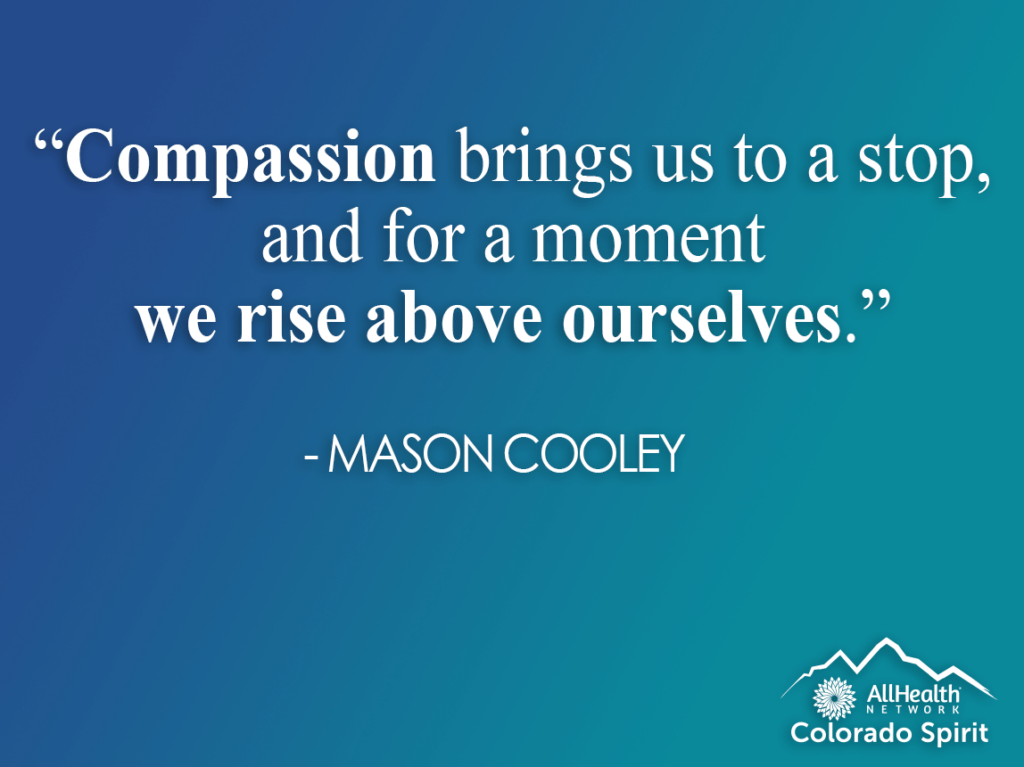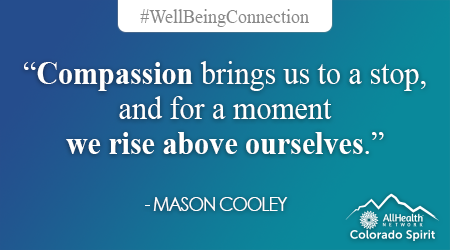Welcome to the Weekly Well-Being Connection! Each week we will share advice from our clinical experts on ways to care for your mental health and well-being throughout COVID-19.
Many thanks to Ayla Cook, LSW, of the Colorado Spirit team for providing this week’s post.
Those of us in the behavioral health field have heard the term “compassion fatigue” used more than ever throughout this pandemic. When we are in spaces where showing up with compassion and empathy is necessary, we run the risk of experiencing compassion fatigue. Although the name of this experience sounds as though it can be solved with rest, it is much more complex. Researchers Adams, Boscarino, and Figley define compassion fatigue as a lowered ability or interest in being empathic or “bearing the suffering’” of others. They see this as a natural consequence of knowing about the trauma and suffering a person has experienced. Signs of compassion fatigue include: emotional exhaustion, a reduced sense of accomplishment in work, mental exhaustion, isolation, depersonalization (feeling disconnected or detached from your body or thoughts), sleep disturbance, loss of hope, depression and anger towards others or causal events. Many who have been providing support and services to the public over the past year may be experiencing signs of compassion fatigue. This can also affect those who are not in a caregiving or medical career field. Family members, friends, neighbors, and volunteers can experience compassion fatigue too. Anyone who is a formal or informal helper has a potential to experience this “cost of caring.”
Many who have been providing support and services to the public over the past year may be experiencing signs of compassion fatigue.
It’s OK to not be OK
The increase in demand for supportive services can heighten the pressure we feel to provide our skills to others. In Psychological First Aid, we discuss that those in the supportive role must be mindful of limitations. Giving beyond our capacity can cause more harm than good, which is why it’s important to practice balance and boundaries. Pay attention to your mood and how your body is responding to stress. If you are noticing signs that reflect compassion fatigue check in on how you are balancing your duties and your boundaries.
Here are a few questions to consider:
- Have I said yes to projects or requests that I don’t have a capacity to fulfill at this time?
- At home/work who can I ask for help, and is there something they can help me with right now?
- What can I do to honor my feelings and needs today?
In practicing these steps and paying attention to how we are responding to stressful environments we can prevent compassion fatigue and experience the satisfaction we hope to have while we care for others.
Compassion Satisfaction
We would like to close with some good news. Just as we can experience compassion fatigue, we can also experience “compassion satisfaction”. When we experience pleasure in the work we do and feel positively about our colleagues and work environment this is called compassion satisfaction. It occurs when we can obtain fulfilment in our roles by overcoming adverse emotional exposure. It can include being able to see the meaningfulness of our personal contributions to the work and the greater good. Implementing steps to enhance compassion satisfaction will aid in preventing the onset of compassion fatigue and can improve our quality of life in and outside of work. While there is no one path to finding compassion satisfaction, here are a few actions to consider:
- Educate yourself about compassion fatigue, compassion satisfaction, and post-traumatic growth (Yes, growth after traumatic events can occur – look for a future post about this topic)
- Build your social support group
- Connect with peers and others who “get it” to seek and give support
- Pay attention to your body and your mood
- Reflect on your contributions and allow yourself to notice and hold on to the ways your compassion and empathy makes a difference.
Would speaking to someone help?
To speak with someone in the Colorado Spirit Program about stress related to the pandemic, please call 720-707-6789 or visit our web page at www.allhealthnetwork.org/Colorado-Spirit
For information about other services at AllHealth Network or to get connected with ongoing behavioral health support, please call: 303-730-8858.
AllHealth Network is continuing to provide service via telehealth or by phone and our Crisis Walk-in Center remains open 24/7. To learn more about what other community mental health centers are doing, please visit The Colorado Behavioral Health Council COVID-19 website.
If you are experiencing a mental health crisis and are in need of immediate assistance, please call the Colorado Crisis Hotline at 1-844-493-TALK (8255) or text TALK to 38255.
Resource links
- UT Health – Compassion Satisfaction and Compassion Fatigue: Helpful Tips for our Frontline Workers
- Taylor and Francis Online – Compassion Fatigue, Compassion Satisfaction, and Burnout: Factors Impacting a Professional’s Quality of Life
- National Institutes of Health – Compassion Fatigue and Psychological Distress Among Social Workers: A Validation Study



